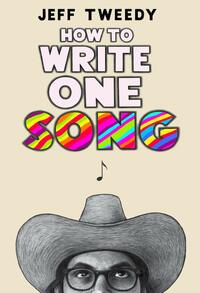Take a photo of a barcode or cover
Very practical and useful guidance on how to set your creative spirit free to help you write one song.
And then, hopefully, others.
And then, hopefully, others.
Not my usual fare, but I'd just listened through a bunch of Wilco albums I'd never checked out and stumbled upon this book in my listening / Googling for album information. I listened to the audiobook, which I would recommend, as there are snippets of conversation (or recreations of conversations) between the author and his wife and also between the author and his brother-in-law, not to mention snippets of songs or examples of potential outcomes for his suggested writing methods. There's also a song, "Gwendolyn", which you hear portions of as he works his way through the exercises he recommends for songwriting, and then in full at the end of the audiobook.
It was a very relaxing listen, and it's fun to hear a musician you've been aware of, and a fan of, for some time just talk about their process for around three hours. Truth be told, I'm fascinated listening to someone describe their process whether I'm a fan or not. It helps, though, that I recognize the songs the author is talking about and I'll say he's a pretty conversational, fun writer to boot. His narration somehow reminds me of the delivery of whoever played Charlie Brown in the old cartoons. A bit hard to explain, but it's a very earnest approach to reading one's own words allowed and it lends itself to a book dispensing guidance and advice intended more to encourage than to "teach".
One thing that surprised me was how many of these methods and exercises I'd stumbled into myself over the years without any prompting. I'm not too proud to admit that this led me to be more and more interested in anything he mentioned that I *hadn't* tried in the process of writing a song yet.
Overall, I'd say this book would be well-liked by people who enjoy Wilco or Jeff Tweedy's solo output regardless of whether they want to write songs, by aspiring songwriters and artists who are looking for prompts or are simply curious about how other folks do the thing, and by any art appreciator who finds themselves gravitating towards longform interviews or essays like those on The Talkhouse or similar outlets, which devote considerable time to artists' philosophy around the process of creation.
It was a very relaxing listen, and it's fun to hear a musician you've been aware of, and a fan of, for some time just talk about their process for around three hours. Truth be told, I'm fascinated listening to someone describe their process whether I'm a fan or not. It helps, though, that I recognize the songs the author is talking about and I'll say he's a pretty conversational, fun writer to boot. His narration somehow reminds me of the delivery of whoever played Charlie Brown in the old cartoons. A bit hard to explain, but it's a very earnest approach to reading one's own words allowed and it lends itself to a book dispensing guidance and advice intended more to encourage than to "teach".
One thing that surprised me was how many of these methods and exercises I'd stumbled into myself over the years without any prompting. I'm not too proud to admit that this led me to be more and more interested in anything he mentioned that I *hadn't* tried in the process of writing a song yet.
Overall, I'd say this book would be well-liked by people who enjoy Wilco or Jeff Tweedy's solo output regardless of whether they want to write songs, by aspiring songwriters and artists who are looking for prompts or are simply curious about how other folks do the thing, and by any art appreciator who finds themselves gravitating towards longform interviews or essays like those on The Talkhouse or similar outlets, which devote considerable time to artists' philosophy around the process of creation.
hopeful
inspiring
reflective
fast-paced
Inspiring and encouraging to be musicians
An interesting look at songwriting. I thought the writing exercises were actually really great and accessible to just about anyone.
Really nice short read with a great combo of self help, motivation/inspiration management, and some mechanical how-to stuff. Really liked Jeff Tweedy’s voice as an author and it kicked off a Wilco binge
I have already written (more than) one song but this book was still wonderful, because I love mr. tweedy's style of writing, and the book is mostly about having the discipline to get something done, which is the sort of thing it is almost always helpful to read about.
How to write a Wilco song
I do not intend to write a song but I enjoyed reading his (non-singing) voice and his surprisingly well-written thoughts on creativity. Now I know where he got the phrase "muzzle of bees," which was always a favorite of mine even if the song wasn't.
I do not intend to write a song but I enjoyed reading his (non-singing) voice and his surprisingly well-written thoughts on creativity. Now I know where he got the phrase "muzzle of bees," which was always a favorite of mine even if the song wasn't.
I really enjoyed the sentiments and advice in this book. There were a lot of validating ideas, like things I already do to write a song. It took me a long time to get into his voice and not think he was being pretentious. The parts of this book that were good were inspiring. 3 stars bc the organization was so horrible and redundant
Fun book on creativity. I think some of his exercises can apply to the general creative process.
This was a really fun book to read. Tweedy doesn't talk about music theory, song structure, recording techniques, or any other more technical aspects of songwriting. Instead, he talks a lot about the mental obstacles we all have to writing music and attempts to help the reader become more curious and childlike in our approach to music. He encourages us not to write great songs, but to write and finish songs, good or bad. Every completed song is great experience for the next song. Songwriting is about having fun. It's not about constant judgement. The book is filled with useful tips on how to jumpstart the lyric-writing process (Part II) or how to break out of a block (Part III). It's funny, insightful, and kind.
If you like to write music, read this book. It's an easy, quick read, but it's very enjoyable. Even if you know most of what is in this book, it's a great reminder of the playfulness that songwriting should be.
If you like to write music, read this book. It's an easy, quick read, but it's very enjoyable. Even if you know most of what is in this book, it's a great reminder of the playfulness that songwriting should be.




